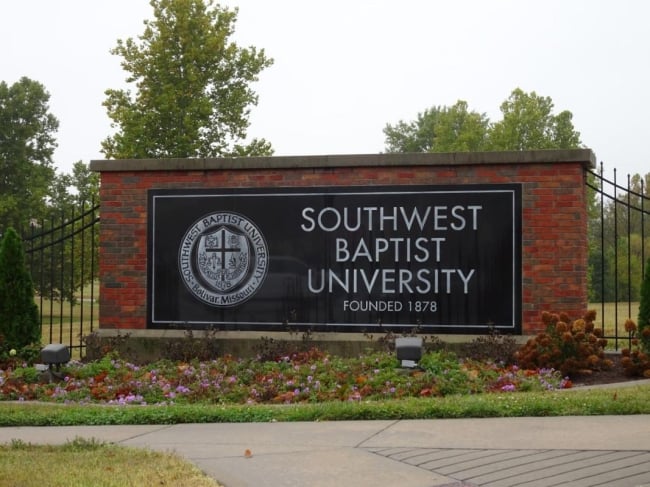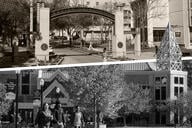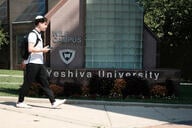You have /5 articles left.
Sign up for a free account or log in.

Southwest Baptist University’s accreditor placed the university on probation this week.
Brian Kaylor/Word & Way
The accreditor for Southwest Baptist University has placed the university on probation, finding that the Missouri institution was out of compliance with three separate accreditation criteria relating to academic freedom, governance and effective leadership.
The Higher Learning Commission (HLC) specifically faulted SBU for attempting to rewrite its governance documents to make the Missouri Baptist Convention its sole “corporate member,” a step intended to shore up the convention’s control of the university. The university dropped the proposed changes to its governance documents in August after individuals affiliated with the university filed two separate petitions in Polk County Court seeking to block the changes, arguing they jeopardized the university’s academic freedom and constituted a “takeover” of SBU by the MBC.
“The initiation of changes to governing documents at the request of the Missouri Baptist Convention (MBC) without prior HLC approval, which would have recharacterized the institution as an entity of MBC with the latter as its sole member and which were only recently rescinded by the Institution’s governing board before becoming legally binding, raises significant questions about the independence and autonomy of the Institution’s governing board to make decisions in the best interests of the Institution,” the accrediting agency wrote in a Nov. 8 letter to SBU president Rick Melson.
The accreditor also said that board members acknowledged to the HLC Institutional Council Hearing Committee that they “had overstepped and intruded in the responsibilities of the administration.”
The HLC’s letter communicating the decision to place the university on probation said that board actions had led to “concerns about unannounced changes being made to the expectations for promotion and tenure.”
The letter also described confusion about SBU’s statements of faith and the relation of those statements to what can be taught in the classroom. The accrediting agency said that “significant confusion” over the applicability of statements of faith to various groups within the institution, including faculty members, “has destabilized and eroded the sense of academic freedom and freedom of expression at the Institution.”
The accreditor’s action, which was first reported by Word & Way, comes after a tumultuous year at SBU marked by conflicts over governance and theological orthodoxy, the elimination of the philosophy department and the position of its sole tenured professor, and a series of tenure and promotion denials, as a board packed with MBC’s chosen nominees sought to impose a narrower statement of faith on SBU’s employees.
The statement of faith adopted by SBU’s board in 2020 affirms the Baptist Faith and Message 2000 as well as “supplemental statements of religious convictions in the Chicago Statement on Biblical Inerrancy, the Nashville Statement, and the Danvers Statement.” The Danvers Statement affirms distinct, divinely ordained gender roles for men and women and man’s “headship” in the family and the church. The Nashville Statement holds that God designed marriage to be between a man and woman and states that “it is sinful to approve of homosexual immorality or transgenderism.”
A former assistant professor of social work at SBU, Dwayne Walker, filed a complaint with HLC after being denied tenure despite strong support from his colleagues, department chair and dean after he said members of the board questioned him about his views on whether homosexuality is always a sin.
“In my mind this action and report substantiates almost everything in my complaint,” Walker said via email Tuesday. “Particularly the part about the actions of the board in relation to my tenure. My question is what are they going to do with this information? Will it lead to positive change? Better yet, what are they going to do about the pain and suffering experienced by myself and other faculty whose lives and careers were changed? Somewhere along the way I think they forgot that their decisions had a very human toll. To me, they have yet to address any of that pain and suffering many of us still feel as a result of their actions. An apology for what we went through would be a great start."
The HLC letter noted several recent actions the SBU board has taken in response to the accreditor’s concerns. For example, the letter cites SBU’s decisions to obtain board training services from the Association of Governing Boards of Universities and Colleges and to begin “a restructuring of policies regarding promotion and tenure to ensure that knowledgeable and experienced board members serve on the committee that has this oversight; however, time is needed for the board to put these policy changes into practice and for the record to reflect a sustained pattern of policy-appropriate board engagement in these activities.”
The HLC said that SBU will be subject to a comprehensive evaluation by a team of peer reviewers no later than April 2023 to determine whether the institution “has ameliorated the findings of noncompliance” and make recommendations as to whether the accreditor should lift the probation or take other action.
In a press release, Melson, who assumed SBU’s presidency in September, said the accreditor’s decision is “based on governance issues and is not a reflection on the quality of SBU’s academic programs, faculty, or staff.”
The press release and a related FAQ document do not specifically reference the finding that the university was not in compliance with the accreditor’s standards on academic freedom and freedom of expression.
“We are working closely with the HLC,” the chairman of SBU’s board, Eddie Bumpers, said in the press release. “We have already taken substantive steps to address the matters identified by HLC. I am confident that under Dr. Melson’s leadership, SBU will become stronger than ever.”
A SBU spokeswoman declined to make any SBU leaders available for interviews Tuesday.
Russell Jackson, a lawyer and SBU alumnus who filed a complaint with HLC, said Tuesday it was “a sad day for all who love SBU.” Jackson also represented a former SBU board member and alumnus, Donald Jump, in one of the lawsuits that sought to block SBU’s attempts to revise its governance documents to fortify the MBC’s control.
“What’s so infuriating is that it didn’t have to happen,” said Jackson, who graduated from SBU as valedictorian in 1987. “HLC’s accreditation criteria are quite clear, and the SBU board’s complete capitulation to the Missouri Baptist Convention’s demands obviously violated those criteria.”
“I hope President Melson embraces the HLC, its criteria and SBU’s history as a true institution of higher learning that is separate from—but friendly to—the MBC,” Jackson said. “The next three months will be very informative.”




